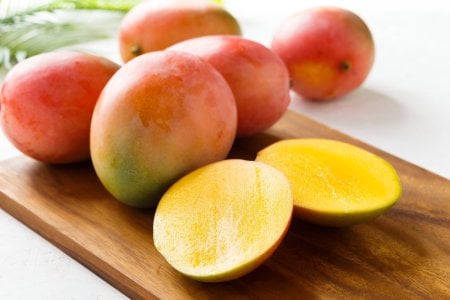Will Aussies face a mango shortage? Farmers reveal shocking details about this year's supply and prices
Mangoes–the classic treat many can’t get enough of in summer. Whether in a smoothie or just straight up by the slice, this tropical treasure is impossible to beat.
However, it looks like this much-loved fruit will be in short supply on supermarket shelves this summer–and worse yet, it’ll be more expensive when you find it.
Queensland farmers, responsible for 40 per cent of Australia’s mango supply, are struggling with a deficit in their yields due to a warmer-than-usual winter.
According to Sandy Cove Mango Plantation owner Brad Bowen, he and many others haven't had the best luck; the warm weather means that there produced fewer flowers, resulting in dwarfed yields for popular mango varieties like the Kensington Pride and R2E2.
'It’s a combination of a warm winter and a big crop last year,' said Mr Bowen, 'but this year’s winter hasn’t been cold enough to get trees to fruit. We’re definitely concerned.'
In fact, Australian Mangoes, the industry peak body for mango farmers, confirmed via their regional update that growers from Mareeba and Dimbulah are reporting much lower volumes of Kensington Pride mangoes compared to last year.
‘The absence of flowers in some Kensington Pride orchards has some growers starting off with disappointment for the beginning of the season as they should be looking at reasonable-sized fruit sets by now, but little to nothing has eventuated,’ they said.
It’s not only bad news for consumers but for mango farmers, too.
'At the end of the day,' said Mr Bowen, 'we need to be able to stay in business so they can turn around and make more fruit next year.'
This is because, despite the ‘massive crop’ last summer, many mango farmers lost money–not because their fruit wasn’t any good, but simply because there was just too much of it.
More than that, the Bureau of Meteorology Queensland noted the warmest winter temperatures, which were 2.32C above average temperatures. Both daytime and minimum temperatures were amongst the highest 10 per cent of winters since 1910.
Mr Bowen is urging shoppers not to be put off by the potentially higher prices and to remember that farmers also need to sustain business costs.
‘We need the retail costs to come up to match the cost of [the] product, but we don’t make to make them unaffordable,’ he stated.
Mr Bowen added: ‘At the end of the day, we need to be able to stay in business so they can turn around and make more fruit next year.’

So, while this year may be more challenging than usual for lovers of mangoes, we must remain hopeful that things will all start to look up and that prices will not be too steep.
What do you think of this story, dear members? Let us know in the comments below!
However, it looks like this much-loved fruit will be in short supply on supermarket shelves this summer–and worse yet, it’ll be more expensive when you find it.
Queensland farmers, responsible for 40 per cent of Australia’s mango supply, are struggling with a deficit in their yields due to a warmer-than-usual winter.
According to Sandy Cove Mango Plantation owner Brad Bowen, he and many others haven't had the best luck; the warm weather means that there produced fewer flowers, resulting in dwarfed yields for popular mango varieties like the Kensington Pride and R2E2.
'It’s a combination of a warm winter and a big crop last year,' said Mr Bowen, 'but this year’s winter hasn’t been cold enough to get trees to fruit. We’re definitely concerned.'
In fact, Australian Mangoes, the industry peak body for mango farmers, confirmed via their regional update that growers from Mareeba and Dimbulah are reporting much lower volumes of Kensington Pride mangoes compared to last year.
‘The absence of flowers in some Kensington Pride orchards has some growers starting off with disappointment for the beginning of the season as they should be looking at reasonable-sized fruit sets by now, but little to nothing has eventuated,’ they said.
It’s not only bad news for consumers but for mango farmers, too.
'At the end of the day,' said Mr Bowen, 'we need to be able to stay in business so they can turn around and make more fruit next year.'
This is because, despite the ‘massive crop’ last summer, many mango farmers lost money–not because their fruit wasn’t any good, but simply because there was just too much of it.
More than that, the Bureau of Meteorology Queensland noted the warmest winter temperatures, which were 2.32C above average temperatures. Both daytime and minimum temperatures were amongst the highest 10 per cent of winters since 1910.
Mr Bowen is urging shoppers not to be put off by the potentially higher prices and to remember that farmers also need to sustain business costs.
‘We need the retail costs to come up to match the cost of [the] product, but we don’t make to make them unaffordable,’ he stated.
Mr Bowen added: ‘At the end of the day, we need to be able to stay in business so they can turn around and make more fruit next year.’
Key Takeaways
- Australians have been warned of a potential shortage of mangoes due to a warmer-than-average winter.
- Queensland mango producers, responsible for over 40 per cent of Australia's supply, face significantly reduced yields.
- Warmer weather resulted in poor flowering rates on the mangoes, including the popular R2E2 and Kensington Pride varieties.
- Despite possible higher prices, the owner of Sandy Cove Mango Plantation urged customers to remember that farmers need to cover business costs to continue producing fruit.
So, while this year may be more challenging than usual for lovers of mangoes, we must remain hopeful that things will all start to look up and that prices will not be too steep.
What do you think of this story, dear members? Let us know in the comments below!








